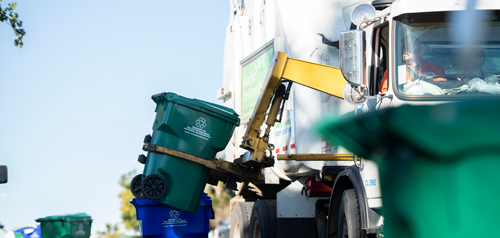Background on Measure B

Measure B, passed by voters in 2022, amended the People's Ordinance of 1919. The People’s Ordinance was an initiative that governed San Diego’s waste management for more than 100 years. The approved 1919 Ordinance required the City to manage trash collection and disposal. The plan at that time was to pay for the new services by subsequently establishing a new fee and by selling solid waste to pig farms as food as an additional revenue source. However, when the People’s Ordinance was adopted, the City Council did not adopt a new fee. Additionally, revenue from pig farms never covered the costs and became an increasingly insignificant source of revenue as the City urbanized. To pay for the service, the City has instead relied on its General Fund, which covers most of the cost of collecting residential waste, in addition to paying for most of the City’s core services, including police and fire services, parks and recreation, and libraries. City leaders recognized the financial impact its trash collection services had on the General Fund. However, in 1986, voters amended the People’s Ordinance to keep the City from charging fees for City trash collection. This resulted in some residents having to pay for the services from a private hauler while other residents received the services from the City at no charge. That is, under the current framework, although all property owners in the City pay the taxes that fund solid waste services for some properties in the City, the owners and residents of single-family homes and condominiums located on private streets or multi-family homes with more than four residences must additionally pay for a private company to collect their trash and recycling.
Measure B amended the Municipal Code by removing the prohibition that previously prevented the City from charging a fee for residential waste and recycling collection services. It also clarified which properties are eligible to receive City-provided services.
In response to the voter passed amendments, the City engaged in a public process to evaluate solid waste management services provided by the City to its residential customers, potential areas for service enhancements, and costs of services. The engagement process included:
- 27 in-person, public, Open House meetings (three in each Council District) and 3 virtual Open House meetings
- 41 community events, and
- More than 64 community presentations
Through these events, City staff have held more than 5,800 in-person conversations with San Diego residents and engaged virtually with more than 4,900. In addition, the City’s outreach efforts are estimated to have reached over 2.3 million people through social media, traditional media, project website visits, and newsletters.
The City also conducted an operational efficiency analysis, including a review of ESD’s Collection Services Division and an assessment of its organizational operations, structure, staffing, safety, training, culture, technology, facilities, equipment, and fleet. These efforts also included a review of the support services provided by the Fleet Operations Division of the Department of General Services (DGS) and coordination and collaboration between ESD and DGS.
Both the public engagement process and the operational efficiency analysis assisted the City in determining the desired service level, which in turn guided the development of a proposed fee schedule that allows the City to recover the costs of providing solid waste management services to its eligible residents. The City completed a cost-of-service study to estimate and document the cost of providing the recommended services, across multiple fiscal years.
On April 14, the Environmental Services Department (ESD) presented the study’s findings, as well as the results of the public outreach process, to City Council. The purpose of the April 14 meeting was to seek authorization to set a public hearing on June 9, 2025 to consider adoption of a new solid waste management fee, to adopt procedures for submitting and tabulating protests against the proposed fee, and to set hearing on June 24, 2025 to consider a report of proposed fees to be collected on the tax roll for the forthcoming fiscal year, if solid waste management fee is adopted which will determine whether to implement a fee for waste collection for eligible City households. More information on the April 14 meeting is available on the City Council Meetings & Agendas webpage.
The actions presented on April 14 passed, and the City Council is scheduled to hold a public hearing on June 9 to consider adoption of a new solid waste management fee.
Please visit CleanGreenSD.org for more information.

